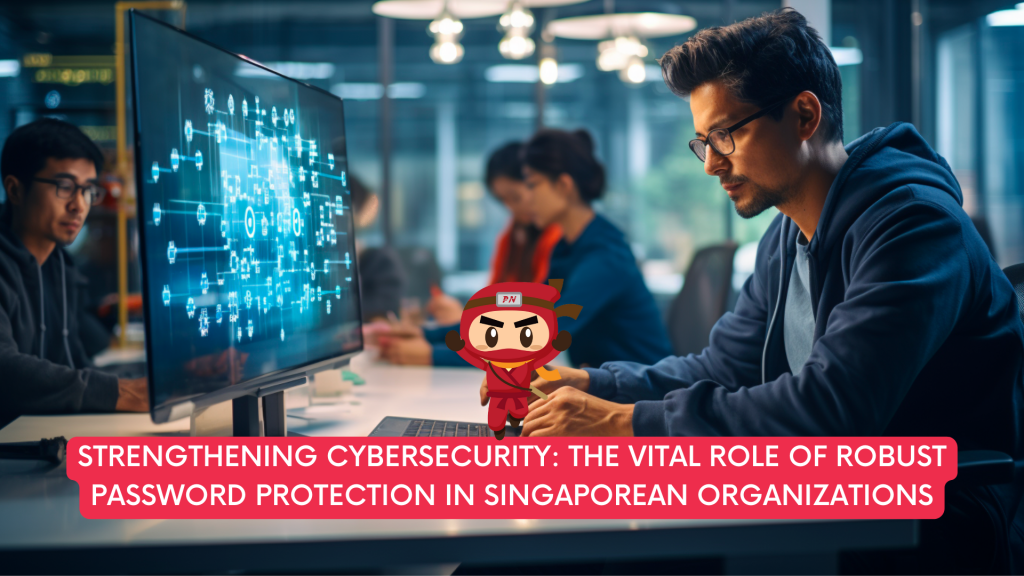
Safeguarding personal data and user accounts is paramount for organizations across Singapore. One fundamental aspect of cybersecurity that cannot be overlooked is password security. Ensuring password security for user accounts should be a standard practice for every organization in Singapore.
It is crucial not to underestimate the importance of robust password protection, as it serves as the primary barrier to unauthorized access within the organization. In this comprehensive article, we delve into the significance of robust password protection, exploring its role in mitigating cybersecurity risks, enhancing data security, and safeguarding organizational assets.
Passwords serve as the first line of defense against unauthorized access to user accounts, systems, and sensitive data within an organization.
Weak or compromised passwords can expose organizations to a myriad of cybersecurity threats, including data breaches, identity theft, and unauthorized access to critical systems and information. Robust password protection is essential for mitigating these risks and preventing unauthorized access to organizational assets.
One of the most significant cybersecurity risks organizations face today is the threat of unauthorized access to user accounts and sensitive information. Weak passwords are a common entry point for cybercriminals seeking to gain unauthorized access to organizational systems and data.
By implementing robust password protection measures, such as enforcing strong password policies, implementing multi-factor authentication, and regularly updating passwords, organizations can significantly reduce the risk of unauthorized access and enhance their overall cybersecurity posture.
In addition to protecting user accounts and systems, robust password protection also plays a critical role in safeguarding sensitive data from unauthorized access and disclosure. Passwords are often used to encrypt and protect sensitive information stored within organizational systems and databases.
Weak or compromised passwords can render these encryption mechanisms ineffective, leaving sensitive data vulnerable to unauthorized access and exploitation.
By ensuring that passwords are strong, unique, and securely managed, organizations can enhance data security and prevent unauthorized access to sensitive information.
Organizational assets, including intellectual property, proprietary information, and financial data, are valuable targets for cybercriminals. Weak or compromised passwords can provide cybercriminals with unauthorized access to these assets, leading to financial loss, reputational damage, and legal liabilities.
Robust password protection is essential for safeguarding organizational assets and preventing unauthorized access to sensitive information. By implementing strong password policies, enforcing password rotation and complexity requirements, and educating employees about the importance of password security, organizations can protect their valuable assets from cyber threats.
1. Strong Password Policies: Organizations should implement strong password policies that require users to create passwords that are complex, unique, and difficult to guess. Passwords should be of sufficient length and complexity to resist brute force attacks and should be regularly updated to prevent unauthorized access.
2. Multi-Factor Authentication (MFA): Implementing multi-factor authentication adds an extra layer of security to user accounts by requiring users to provide additional verification, such as a one-time passcode sent to their mobile device, in addition to their password. MFA helps prevent unauthorized access even if a password is compromised.
3. Regular Password Updates: Encourage users to regularly update their passwords to reduce the risk of password compromise. Passwords should be updated at least every 90 days or sooner if there is any suspicion of compromise.
4. Employee Education and Training: Educating employees about the importance of password security and providing training on best practices for creating and managing passwords can help reinforce the importance of robust password protection and reduce the risk of password-related security incidents.
Ensuring password security for user accounts should be a standard practice for every organization in Singapore. Robust password protection plays a critical role in mitigating cybersecurity risks, enhancing data security, and safeguarding organizational assets.
By implementing strong password policies, enforcing multi-factor authentication, and educating employees about the importance of password security, organizations can enhance their overall cybersecurity posture and protect against unauthorized access to sensitive information.
Ultimately, investing in robust password protection is essential for safeguarding organizational assets and maintaining trust with stakeholders in today’s increasingly digital world.
Your appointed DPO can work with you on your PDPA compliance, ensuring that there will be policies in place to make sure that the handling of personal data is PDPA compliant.
A Data Protection Officer (DPO) oversees data protection responsibilities and ensures that organisations comply with the Personal Data Protection Act (PDPA). Furthermore, every Organisation’s DPO should be able to curb any instances of PDPA noncompliance as it is the officer responsible for maintaining the positive posture of an organisation’s cybersecurity.
DPOs complement organisations’ efforts to ensure that the organisation’s methods of collecting personal data comply with the PDPA. It also ensures that policies are set in place to make sure that there will be no instances of data breaches in the future.
Don’t wait any longer to ensure your organisation is PDPA compliant. Take our free 3-minute PDPA Compliance Self-audit checklist now, the same “secret weapon” used by our clients to keep them on track. Upon completion, we will send you the results so you can take the necessary action to protect your customers’ data. Complete the free assessment checklist today and take the first step towards protecting your customers’ personal data.
Role of Enhanced Access Controls in Safeguarding Personal Data in Telecommunications that every Organisation in…
Effective Incident Response Procedures in Strengthening Data Security that every Organisation in Singapore should know…
Crucial Role of Regular Vulnerability Scanning that every Organisation in Singapore should know. Strengthening Your…
Enhancing Data Security with Multi-Factor Authentication that every Organisation in Singapore should know. Enhancing Data…
Strong Password Policy as a first line of defense against data breaches for Organisations in…
Importance of Efficient Access Controls that every Organisation in Singapore should take note of. Enhancing…
This website uses cookies.